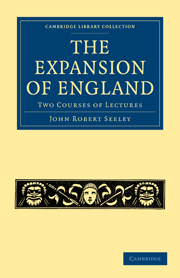Book contents
LECTURE II - THE INDIAN EMPIRE
Published online by Cambridge University Press: 05 August 2011
Summary
As formerly the Colonial Empire, so now the Indian Empire is to be considered only so far as it illustrates the general law of expansion which prevails in the modern part of English history. It will be considered not in itself, but only in its relation to our own state. It will be considered historically, that is, in the causes which produced it, but also politically, that is, in regard to its value or stability.
From this point of view we shall not find it convenient to observe chronological order. Our acquisition of India was made blindly. Nothing great that has ever been done by Englishmen was done so unintentionally, so accidentally, as the conquest of India. There has indeed been little enough of calculation or contrivance in our colonisation. When our first settlers went out to Virginia and New England, it was not intended to lay the foundations of a mighty republican state. But here the event has differed from the design only in degree. We did intend to establish a new community, and we even knew that it would be republican in its tendency; what was hidden from us was only its immense magnitude. But in India we meant one thing, and did quite another. Our object was trade, and in this we were not particularly successful.
- Type
- Chapter
- Information
- The Expansion of EnglandTwo Courses of Lectures, pp. 179 - 196Publisher: Cambridge University PressPrint publication year: 2010First published in: 1883

